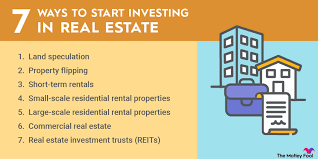
Investing in Real Estate: Simple and Effective Ways to Get Started
We understand the importance of making sound investment decisions at David T Rosen. Real estate is an excellent investment vehicle that can generate passive income, tax benefits, and long-term appreciation. However, it can seem intimidating and overwhelming if you are new to real estate investing. This article will provide simple and effective ways to get started in real estate investing.
- Start with Your Own Home
Buying a primary residence is one of the easiest ways to start investing in real estate. Your primary residence is not just a place to live; it can also be a wise investment. By owning a home, you can build equity, take advantage of tax benefits, and potentially earn a profit when you sell.
- Consider House Hacking
House hacking is a strategy where you live in one unit of a multi-unit property and rent out the other units to generate income. This strategy can be an excellent way to start real estate investing without a large down payment. You can also use the revenue generated from renting out the property prices of other units to cover your mortgage payment, making it easier to afford the property.
- Invest in a Real Estate Investment Trust (REIT)
If you want to invest in real estate but do not want the hassle of being a landlord, a Real Estate Investment Trust (REIT) may be a good option. A REIT is a company that owns and operates income-generating real estate properties. You can buy shares in a publicly-traded REIT and earn a portion of the income generated by the properties.
- Flipping Houses
House flipping involves buying, renovating, and selling a distressed property for a profit. This strategy requires some home renovation knowledge, but it can be a lucrative way to invest in real estate. First, however, researching and understanding the risks involved in this strategy is essential.
- Invest in Rental Properties
Investing in rental properties can be an excellent way to generate passive income. You can purchase a rental property, find a tenant, and collect rent monthly. However, being a landlord requires work, such as finding tenants, managing the property, and handling repairs. Therefore, understanding the responsibilities and potential challenges of being a landlord is crucial before investing in rental properties.
- Consider Real Estate Crowdfunding
Real estate crowdfunding is a relatively new way to invest in real estate. It involves pooling money with other investors to invest in a real estate project. Real estate crowdfunding platforms connect investors with real estate developers who need project funding. This strategy can be an excellent way to invest in real estate without purchasing an entire property.

- Get Educated
Education is critical to success in any field, and real estate investing is no exception. Take the time to learn about the different types of real estate investments, their pros and cons, and the risks involved. Attend seminars, read books, and follow successful real estate investors to gain insights into the industry.
- Build a Network
Building a network of professionals can help you succeed in real estate investing. Connect with real estate agents, contractors, attorneys, and other investors to learn from their experiences and gain valuable insights. Join real estate investing groups, attend networking events, and engage in online forums to expand your network.
- Conduct Due Diligence
Before investing in any real estate investment property here, conduct due diligence to ensure you make an informed investment decision. This includes researching the property’s location, analyzing the property’s financials, and understanding the local real estate market. Hire professionals, such as home inspectors and appraisers, to help you evaluate the property.
- Have a Plan
Real estate investing requires a plan. First, define your investment goals, such as generating passive income or flipping properties, and develop a strategy to achieve them. Next, determine your budget, identify potential investment properties around you, and establish criteria for evaluating investment opportunities. Having a plan can help you stay focused and make informed investment decisions.
- Choose the Right Financing Option
Real estate investing can be capital intensive, and choosing the right financing option can be crucial to the success of your real estate investment group. First, consider your budget, credit score, and investment goals when choosing between traditional mortgages, hard money loans, and private lending options. Then, explore all available options, and weigh the pros and cons before deciding.
- Consider Tax Implications
Real estate investing can have significant tax implications, both positive and negative. Consult with a tax professional to understand how your investment will affect your tax liability and explore strategies for minimizing your tax burden. For example, taking advantage of deductions and depreciation for property taxes can help reduce your taxable income and increase your cash flow.
- Leverage Technology
Technology has revolutionized the real estate industry, and investors who leverage it can gain a competitive edge. Use online resources to research properties, analyze the local market, and manage your investments. Consider using software and apps from online real estate platforms that can help streamline your workflow, automate tasks, and provide valuable insights into your assets.
- Diversify Your Portfolio
Diversification is critical to mitigating risk in any investment portfolio, and real estate investing is no exception. Consider investing in a mix of property types, such as residential, commercial, and industrial, as well as in different geographic locations. This can help reduce your exposure to market fluctuations and economic downturns.
- Stay Informed
Real estate investing is dynamic, and staying informed is crucial to success. Stay up-to-date on industry trends, changes in regulations, and economic indicators that can affect your investments. Subscribe to industry publications, attend seminars and conferences, and network with other investors to stay informed and gain valuable insights.
Following these fifteen tips, you can create a successful real estate investment strategy to help you achieve your financial goals. Remember to be patient, persistent, and disciplined, and always conduct due diligence before making good real estate investment decisions. With the right strategy, mindset, and network, you can become a successful real estate investor and build long-term wealth.
In conclusion, investing in real estate can be an excellent way to build wealth, generate passive income, and diversify your investment portfolio. By following these simple and effective ways to get direct real estate investments started you can confidently begin your journey into real estate investing. Remember to research, understand the risks, and make informed investment decisions.

A comprehensive guide on simple ways to invest in real estate
Thank you for reading our comprehensive guide on simple ways to invest in real estate. We hope our tips will help you develop a successful real estate investment strategy and achieve your financial goals.
Real estate investing can be rewarding and lucrative, but it has challenges. Success as a real estate agent in this competitive market requires patience, discipline, and hard work. However, with the right mindset, strategy, and network, you can overcome these challenges and achieve financial freedom through real estate investing.
Please get in touch with us if you have any questions or comments about the information we’ve to share, please get in touch with us. We are always happy to help aspiring real estate investors navigate the complex world of real estate investing.
Remember always to conduct due diligence and seek the advice of experienced professionals before making any investment decisions about owning real estate. You can become a successful real estate investor and build long-term wealth with persistence and dedication.

Real Estate Investing Guide
Real estate investment is a great way to build wealth and generate passive income. Moreover, it is an investment that has stood the test of time and has proven to be a reliable way to create long-term wealth. This guide will explore the various aspects of real estate investing, from the basics to advanced techniques seasoned investors use.
The Basics of Real Estate Investing
Real estate investing involves purchasing property to generate income. There are two main types of real estate investments: residential and commercial real estate. Residential properties, such as single-family homes, apartments, and condominiums, are used for living purposes. Commercial properties, such as office buildings, retail spaces, and warehouses, are used for business purposes.
One of the most common ways to invest in real estate is to purchase rental properties. Rental properties can generate passive income by renting out the property to tenants. The rent collected from tenants can cover the mortgage payment and create a profit. Additionally, rental properties can appreciate over time, leading to long-term wealth generation.
Another way to invest in real estate is through real estate investment trusts (REITs). REITs are companies that own and operate income-generating real estate properties. Investors can purchase shares in REITs, which gives them exposure to real estate investments without having to purchase and manage properties or other real estate investments themselves directly.
Advanced Real Estate Investing Techniques
There are several advanced real estate investing techniques that seasoned investors use to generate higher returns. One such method is flipping properties. Flipping involves purchasing, renovating, and selling a distressed property for a profit. This technique requires significant capital and expertise in real estate investing, but it can lead to substantial gains.
Another advanced real estate investing technique is the use of leverage. Leverage involves using borrowed money to purchase properties. This can amplify returns, but it also comes with higher risk. Before using this technique, therefore, it is essential to understand the risks involved with leverage thoroughly.
Real estate investing is a reliable way to build wealth and generate passive income. There are many ways to invest in real estate, from purchasing rental properties to investing in REITs. Advanced and indirect real estate investing and estates investing techniques, such as flipping and leverage, can generate higher returns but also come with higher risk. Nevertheless, investors can create a successful portfolio by understanding the basics of real estate investing and exploring advanced techniques.

Real Estate Investment Strategies
Regarding real estate investing, various real estate investment groups and strategies can be utilized to generate income and build wealth. The most popular strategies include buy and hold, flipping, and wholesaling.
Buy and Hold Strategy
The buy-and-hold strategy involves purchasing a property and holding onto it for an extended period, typically several years or even decades. During this time, the property is rented out to generate passive income. The rental income can be used to pay off the mortgage and generate a profit, and the property can appreciate over time, creating long-term wealth.
Flipping Strategy
The flipping strategy involves purchasing, renovating, and selling a distressed property for a profit. This strategy can be very lucrative, but it also requires significant capital and expertise in real estate investing. The key to success with flipping is to purchase a property at a low price, renovate it quickly and efficiently, and then sell it for a higher price than the purchase and renovation costs.
Wholesaling Strategy
The wholesaling strategy involves purchasing a property and then quickly selling it to another investor without renovating or improving it. This strategy can be a good way to generate quick profits, but it requires a strong network of contacts and a deep understanding of the local real estate market.
Real Estate Investment Risks
While real estate investing can be lucrative, it also comes with risks that investors should be aware of. Some of the most common risks associated with real estate investing include market, property, and financing risks.
Market risk refers to the chance that the real estate market will experience a downturn, resulting in a decline in property values. Property risk refers to the possibility that the property will become damaged or otherwise unrentable, resulting in a loss of rental income. Finally, financing risk refers to the chance that the investor will not be able to secure financing for the property, resulting in a loss of the investment.
Conclusion
Real estate investing is a proven strategy to generate passive income and build long-term wealth. Investors can create a successful real estate investment portfolio by utilizing investment strategies such as buy and hold, flipping, and wholesaling. However, investors must also be aware of the risks associated with real estate investing and take steps to mitigate these risks.
CoopBusiness is a revolutionary cooperative business-building platform that empowers individuals to become entrepreneurs, business owners, and financially independent.
As a member, you’ll receive top-level business mentorship, access to our proprietary business systems, and the opportunity to access the funds you want to turn your business ideas into reality.